
Applications in Energy and Combustion Science
Scope & Guideline
Fueling Knowledge in Energy and Combustion Science
Introduction
Aims and Scopes
- Advanced Combustion Technologies:
Research on innovative combustion technologies, including MILD combustion, rotating detonation engines, and plasma-assisted combustion, aimed at enhancing efficiency and reducing emissions. - Alternative Fuels and Energy Carriers:
Exploration of alternative fuels such as hydrogen, ammonia, and biofuels, focusing on their combustion characteristics, safety, and integration into existing energy systems. - Combustion Modeling and Simulation:
Development and application of computational models, including large-eddy simulations and machine learning approaches, to predict combustion behavior and optimize performance. - Emission Control and Environmental Impact:
Studies addressing the formation and reduction of pollutants (NOx, CO2) during combustion processes, and the environmental implications of various combustion technologies. - Nanoparticle Synthesis and Characterization:
Research into flame synthesis methods for producing nanoparticles, with a focus on their applications in energy storage, catalysis, and environmental remediation. - Thermochemical Processes:
Investigation of thermochemical cycles and chemical looping for CO2 capture and hydrogen production, emphasizing sustainability in energy conversion.
Trending and Emerging
- Hydrogen and Ammonia as Fuels:
There is a significant increase in research centered around hydrogen and ammonia as alternative fuels, highlighting their potential in decarbonizing the energy sector and reducing reliance on fossil fuels. - Machine Learning and Data-Driven Approaches:
The integration of machine learning techniques for combustion modeling and optimization is becoming prominent, showcasing a trend towards leveraging advanced computational methods to enhance combustion efficiency. - Safety and Risk Management in Energy Systems:
Emerging themes focus on safety assessments, particularly concerning lithium-ion battery fires and hydrogen safety, reflecting growing concerns over the safe implementation of new energy technologies. - Nanotechnology in Energy Applications:
Research on the synthesis and application of nanoparticles in energy systems is gaining traction, particularly regarding their use in catalysis and enhancing combustion processes. - Carbon Capture and Utilization Technologies:
An increasing number of studies are dedicated to carbon capture technologies, especially chemical looping and thermochemical processes, emphasizing the importance of mitigating greenhouse gas emissions.
Declining or Waning
- Conventional Fossil Fuel Combustion:
There is a noticeable decline in studies focused on traditional fossil fuel combustion processes as the field shifts towards cleaner and more sustainable energy sources. - Biomass Gasification Studies:
Research specifically targeting biomass gasification appears to be waning, possibly due to a growing emphasis on more direct energy conversion methods and alternative fuels. - Low-Temperature Combustion Research:
The focus on low-temperature combustion techniques has decreased, likely as researchers pivot to high-efficiency combustion methods that have more immediate applications in reducing emissions.
Similar Journals
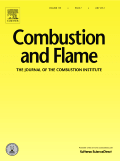
Combustion and Flame
Unraveling the Science Behind CombustionCombustion and Flame is a premier academic journal published by Elsevier Science Inc, dedicated to advancing the field of combustion science. Since its inception in 1957, this journal has consistently provided a platform for rigorous research and groundbreaking discoveries in the realms of Chemical Engineering, Chemistry, and Energy Engineering, illustrating a significant Q1 ranking across multiple categories, including Fuel Technology and Physics. With an impressive Scopus ranking, comprising the top 10% in fields such as General Physics and Astronomy, and General Chemical Engineering, Combustion and Flame serves as a critical resource for researchers, professionals, and students aiming to explore the complexities of combustion phenomena and their applications. Although it does not offer open access, the journal is known for its comprehensive articles and innovative research papers, fostering scholarly dialogue and the development of emerging technologies. The journal aims to connect researchers globally, ensuring that important findings are shared and disseminated effectively.
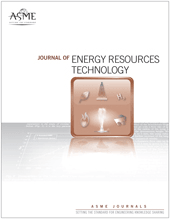
JOURNAL OF ENERGY RESOURCES TECHNOLOGY-TRANSACTIONS OF THE ASME
Driving excellence in energy resources research since 1979.JOURNAL OF ENERGY RESOURCES TECHNOLOGY-TRANSACTIONS OF THE ASME is a prestigious journal dedicated to advancing the knowledge and application of energy resources technology across various disciplines. Published by the American Society of Mechanical Engineers (ASME), this journal plays a critical role in fostering innovative research within energy engineering, fuel technology, geochemistry, and mechanical engineering, evidenced by its solid impact factor and commendable Scopus rankings, including a Q1 ranking in Mechanical Engineering. The journal's comprehensive scope covers a wide array of subjects, from renewable energy solutions to sustainability practices, making it an essential platform for researchers, professionals, and students eager to contribute to and stay abreast of developments in the energy sector. With an impressive convergence history dating back to 1979, it continues to uphold rigorous academic standards and provides valuable insights into the latest technological advancements and methodologies relevant to the field. While the journal does not offer open access options, it is unequivocally a vital resource for those engaged in cutting-edge energy research.
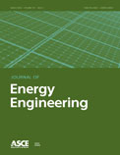
JOURNAL OF ENERGY ENGINEERING
Connecting Ideas for Sustainable Energy PracticesJOURNAL OF ENERGY ENGINEERING, published by the ASCE-Amer Soc Civil Engineers, serves as a pivotal resource in the fields of civil and structural engineering, energy engineering, and nuclear energy research. With an ISSN of 0733-9402 and an E-ISSN of 1943-7897, this esteemed journal demonstrates a consistent commitment to advancing knowledge in energy systems, sustainability, and waste management. Ranking within the second quartile in several categories—including Civil and Structural Engineering and Energy Engineering and Power Technology—this journal maintains a strong reputation, underscored by its Scopus rankings that place it in the top tiers of its discipline. Accessible from 1982 through 2024, the journal provides researchers and professionals meaningful insights through rigorously peer-reviewed articles, critical reviews, and case studies that address contemporary challenges in energy utilization and infrastructure development. Without open access options, it ensures the integrity and credibility of published work, showcasing influential research that contributes to sustainable solutions in energy and environmental frameworks. Researchers, professionals, and students alike will find the JOURNAL OF ENERGY ENGINEERING an indispensable platform for exploration and dissemination of innovative ideas within the realm of energy and engineering.
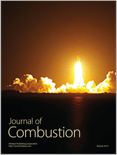
Journal of Combustion
Fueling Research for a Sustainable FutureJournal of Combustion is a premier academic journal dedicated to the field of combustion science and technology, published by HINDAWI LTD. With an ISSN of 2090-1968 and an E-ISSN of 2090-1976, the journal has been an open-access platform since 2008, ensuring that cutting-edge research is accessible to all. Based in the United States at Adam House, 3rd Flr, 1 Fitzroy Sq, London W1T 5HF, England, the journal publishes articles spanning various relevant disciplines, contributing to knowledge in Chemical Engineering, Fuel Technology, and Energy Engineering. As of 2023, it ranks in the Q3 quartile in Chemical Engineering (miscellaneous) and Fuel Technology, and in Q4 in Condensed Matter Physics and Energy Engineering and Power Technology, highlighting its growing impact and relevance in these fields. Researchers will find valuable insights as the journal converges its findings from 2010 to 2024. With a focus on promoting innovative approaches and exploring new frontiers in combustion research, the Journal of Combustion continues to be an essential resource for academics, professionals, and students committed to advancing the understanding and application of combustion processes.
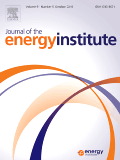
JOURNAL OF THE ENERGY INSTITUTE
Transforming Energy Challenges into Sustainable SolutionsJOURNAL OF THE ENERGY INSTITUTE, published by Elsevier Science Ltd, is a leading interdisciplinary journal dedicated to the advancing fields of energy engineering and technology. With its ISSN 1743-9671 and E-ISSN 1746-0220, this journal has established a prominent reputation, evident from its impressive impact factor and strong rankings across multiple categories, achieving Q1 status in fields such as Condensed Matter Physics, Control and Systems Engineering, and Energy Engineering and Power Technology. As a pivotal resource for researchers, professionals, and students alike, the journal covers a comprehensive spectrum of topics in energy, including recent innovations in renewable energy technologies, sustainable practices, and advancements in fuel technologies. Researchers are encouraged to explore its open-access options for broad dissemination of knowledge, contributing to a more sustainable and energy-efficient future. With a converged history from 2004 to 2024, the JOURNAL OF THE ENERGY INSTITUTE remains a critical platform for cutting-edge research and development in the energy sector, promoting impactful solutions to global energy challenges.

Journal of the Korean Society of Combustion
Transforming Theoretical Insights into Practical SolutionsThe Journal of the Korean Society of Combustion, published by the esteemed Korean Society of Combustion, is a pivotal platform that disseminates groundbreaking research in the field of combustion science. With its ISSN 1226-0959 and E-ISSN 2466-2089, this journal serves as a reliable source for both theoretical developments and practical applications pertaining to combustion technologies. As part of the thriving research community in South Korea, the journal plays a crucial role in advancing knowledge on combustion processes, alternative fuels, and emissions reduction technologies. Researchers, professionals, and students alike benefit from the journal's commitment to high-quality publications that foster innovation and collaboration within the interdisciplinary realms of energy and environmental sciences. While currently not an open-access journal, the Journal of the Korean Society of Combustion ensures that its content remains accessible to a broad audience through institutional subscriptions and partnerships, reinforcing its impact in the academic community.
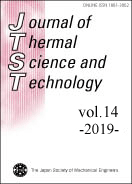
Journal of Thermal Science and Technology
Connecting researchers with cutting-edge findings in thermal technology.Journal of Thermal Science and Technology, published by the Japan Society of Mechanical Engineers, is a distinguished open-access journal that has been serving the academic community since its inception in 2009. With a commitment to disseminating cutting-edge research in the realms of thermal science and its engineering applications, the journal has established itself as an essential resource for researchers, professionals, and students alike. Holding important quartile rankings in 2023, including Q3 in Atomic and Molecular Physics, Engineering (miscellaneous), and Materials Science (miscellaneous), this journal showcases high-impact studies that contribute to the advancement of technology and materials engineering. Open access since 2021, it aims to enhance the visibility and accessibility of critical research findings, thus fostering innovation and collaboration within the global scientific community. The journal’s dedicated editorial board actively seeks to publish novel insights that not only engage with existing challenges but also inspire future developments in thermal science and technology.

THERMAL ENGINEERING
Transforming Thermal Engineering for Tomorrow's ChallengesTHERMAL ENGINEERING is a premier journal dedicated to advancing the field of thermal engineering, with particular importance in the domains of Energy Engineering, Nuclear Energy, and Power Technology. Published by PLEIADES PUBLISHING INC, this esteemed journal has been providing significant scholarly contributions since its inception, with its converged years spanning from 1970 to 2024. Though currently non-open access, the journal presents a unique avenue for researchers, professionals, and students to explore groundbreaking research and innovative solutions related to energy systems and thermal processes. With a notable impact factor and positioned in the Q3 quartile for both Energy Engineering and Nuclear Energy, THERMAL ENGINEERING ensures the dissemination of high-quality research with a global reach, making it an essential resource for those looking to stay at the forefront of essential energy technologies and engineering advancements.
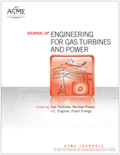
JOURNAL OF ENGINEERING FOR GAS TURBINES AND POWER-TRANSACTIONS OF THE ASME
Advancing the Future of Energy EngineeringJournal of Engineering for Gas Turbines and Power - Transactions of the ASME, published by the esteemed American Society of Mechanical Engineers (ASME), is a leading interdisciplinary journal dedicated to advancing the fields of energy engineering, aerospace, nuclear energy, and mechanical engineering. With an impressive history dating back to 1960 and continuing its contributions through 2024, this journal boasts a Q2 ranking in multiple engineering categories, reflecting its strong impact on both academia and industry. Although not an open-access journal, it provides invaluable insights and research findings that cater to the needs of professionals, researchers, and students alike. The journal's ISSN is 0742-4795 with an E-ISSN of 1528-8919, ensuring widespread visibility in the global academic community. Indexed in Scopus, it ranks notably within its fields—21st in Nuclear Energy and Engineering and 51st in Aerospace Engineering—underscoring its relevance and contribution to critical technological advancements. Researchers in this domain will find the journal a vital resource for innovative studies, practical applications, and the latest developments related to gas turbines and power generation.
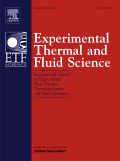
EXPERIMENTAL THERMAL AND FLUID SCIENCE
Exploring the dynamics of heat and fluid with cutting-edge studies.EXPERIMENTAL THERMAL AND FLUID SCIENCE is a prestigious academic journal published by Elsevier Science Inc, dedicated to advancing the fields of thermal and fluid sciences. With a strong focus on innovative experimental research, it plays a crucial role in disseminating new knowledge and techniques across multiple domains, including Aerospace Engineering, Chemical Engineering, Fluid Flow and Transfer Processes, Mechanical Engineering, and Nuclear Engineering. Holding a notable impact factor and ranking in the Q1 quartile across these categories since 2023, the journal is recognized for its high-quality contributions, which appeal to a diverse audience of researchers, industry professionals, and students alike. Additionally, with dedicated coverage from its inception in 1988 to projections extending through 2025, EXPERIMENTAL THERMAL AND FLUID SCIENCE provides a vital platform for sharing advancements in experimental techniques and findings that shape the future of engineering and applied sciences.